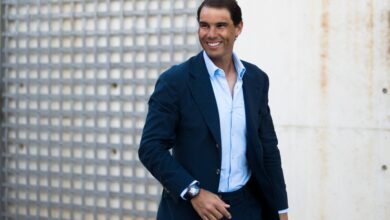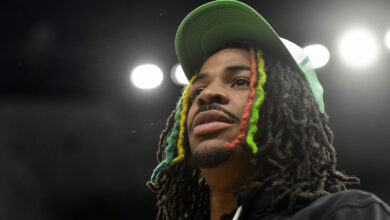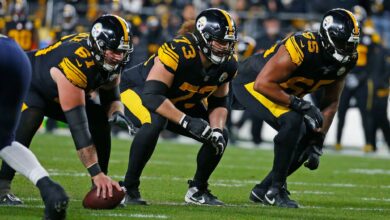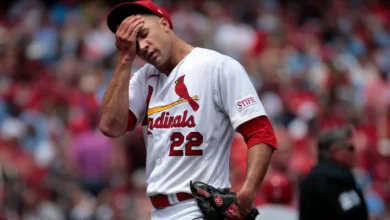LAST SUMMER, NOVAK DJOKOVIC HAD A CALENDAR-YEAR SLAM IN SIGHT. PRETTY MUCH NOTHING HAS GONE TO PLAN FOR HIM SINCE
From a self-imposed deportation to a brutal draw to ranking point losses-and with more questions to come-the Serbian’s 2022 has been a grand disappointment.
HIGHLIGHTS: Djokovic’s loss to Nadal at Roland Garros
On three occasions, Novak Djokovic has come close to reaching the most elite echelon in professional tennis: winning all four Grand Slam tournaments in the same year. It’s an achievement only two other men, Don Budge and Rod Laver, have accomplished. Djokovic was denied by one major title in 2011, 2015 and 2021.
Yet 2022 has provided the Serbian little chance for redemption. He has been sidetracked by numerous hurdles, some self-imposed, after coming just three sets away from completing the calendar-year Grand Slam at last year’s US Open.
Australian Open
Djokovic began the year without Marian Vadja, who had been a part of his coaching staff for every major win short a brief interlude in 2017. After 16 years together, even the most sturdy athlete would feel repercussions of such a split.
Then came his highly publicized deportation from Australia in the lead-up to the Australian Open, as a result of his decision to remain unvaccinated against COVID-19.
A backlash of scrutiny followed, as the world’s top-ranked tennis player became an lightning rod for the vaccine debate.
As the hard-court circuit continued, Djokovic was forbidden to enter the United States to compete in the BNP Paribas Open and Miami Open due to vaccine requirements.
Even when he finally competed in Masters 1000 competition, in Monte Carlo, it was as if the emotional fatigue of uncertainty wore him down in an opening-round loss to world No. 46 Alejandro Davidovich Fokina.
It was Djokovic’s earliest departure from the tournament since 2016, and his second straight defeat to an opponent ranked below the Top 40.
Roland Garros
While Djokovic bounced back on clay in Belgrade (runner-up), Madrid (semifinal loss to Carlos Alcaraz in three sets) and Rome (winner), he admitted to having a lack of balance and searching still for his state of mind, body and soul-and to being more nervous and defensive than usual. (See his interview with Tennis Channel on the subject below.) Whatever you think about Djokovic, that’s understandable, given all the turmoil he has faced this year in the public eye.
That state of uncertainty has not diminished since Roland Garros, where even though Djokovic gave a focused and resilient performance in the early rounds, signs of a shaken confidence showed during his quarterfinal loss to the resounding fan favorite Rafa Nadal. (Tough draw, by the way.)
Coach Goran Ivanisevic spoke of that psychological aspect afterwards, bluntly stating, “Rafa did not play a spectacular match, but the body language decided, from the first point until the last: Rafa’s body language and Novak’s body language.”
Wimbledon and beyond
Adding to Novak’s setbacks at the moment are Wimbledon being stripped of ranking points in response to the tournament’s ban on Russian and Belarussian players, and the US Open announcing (for now) that it will not seek exemptions for unvaccinated foreign players to compete in August.
If that stance holds, Djokovic will not be allowed to compete in yet another major, and he’d also lose the ranking points earned from this second-place finish in New York in 2021.
The crowd rooted hard for Djokovic that day, but it remains to be seen if he’ll play in front of any crowd-rooting for or against him-this time around.
Meanwhile, amidst all the chaos, his patch partnership sponsors, Peugeot and UKG, both stepped away from renewal opportunities.

There are those who will insist that the lowest point in the 20-time Grand Slam champion’s career is 2022, but to view his journey from that narrow perspective does an injustice to the much larger story of his life.
Two flames that seem to keep this star burning bright are his experiences as a child growing up in war-torn Serbia and his family. These two threads weave in and out of Djokovic’s life on the court, as reasons for competing and being victorious.
As a young boy, Djokovic did not even let the 78-day bombing campaign NATO conducted on Belgrade in 1999 stop him from practicing his tennis. He’s used to accomplishing the improbable, and to prevailing against formidable circumstances. That trend has continued into his adulthood and professional life.
In 2016, Djokovic became the eighth man to complete the career Grand Slam, after years of chasing an elusive Roland Garros title.
Years later, in hindsight, he spoke of an emotional exhaustion from that accomplishment, and how his ranking plummeted from No. 1 to No. 22 in the years that followed. (It was his lowest ranking since he was at No. 22 as a 19-year-old, and he was still recovering from an elbow injury that he had avoided treating properly for over 2 years.)
Novak Djokovic
When I finally reached [the career Grand Slam], I felt a huge joy, content and relief, but at the same time also exhaustion. It took a lot out of me. I kind of for a year and a half had to recover in terms of emotions. I had an elbow issue and everything. I felt that I basically got back on track in 2018.
After a rocky start to 2018, Djokovic won both Wimbledon and the US Open, and became the first player to collect all nine ATP Masters 1000 titles. And with a 22-match win streak, he’d completed a remarkable comeback climb back to No. 1 in five months. (Coincidentally, he literally climbed a mountain that year with his wife, Jelena.)
While 2020 was a curtailed year for all, Djokovic managed to make headlines and come away with a Grand Slam title at the Australian Open. He played in the French Open again. But most will recall Djokovic’s 2020 for his staging of the precaution-less Adria Tour in the peak of the pandemic, and for his US Open, where he accidentally hit a lineswoman in the throat with a ball and was defaulted.
While he rallied at the next major, defeating Medvedev in the Australian Open final to lift his ninth title in Melbourne, he would ultimately lose his biggest match against the Russian in 2021 in straight sets-sandwiched around a shocking collapse from a set and a break up against Alexander Zverev at the Olympic Games, where Djokovic had gold-medal aspirations.
Djokovic, months after his 6-4, 6-4, 6-4 loss to Daniil Medvedev in Flushing Meadows last year.
I’m very relieved that the calendar, that the Grand Slam season was done, because I felt a tremendous pressure unlike anything I felt in my life.
Djokovic has been heralded as a genius by more than one coach, including his very first, Jelena Genčić. And while his intelligence, resiliency, precision and passion have led to that conclusion, one could say his focus is on a bigger prize than the calendar Grand Slam: quality time with his family.
For all his accomplishments and accolades, there is still one coveted recognition he sees worth fighting for-one that may save a trying 2022.
“I’m very grateful and blessed to have this opportunity,” Djokovic said after his win at the 2021 Paris Masters. “It’s actually one of the biggest reasons that I keep on playing because I always dreamed of having my children on the stands.
This is what life is all about, sharing these moments with the dear ones and my children are my greatest success, greatest treasure … Them supporting me just brings love and joy to my life.”
Given the struggles and setbacks Djokovic has gone through in his life, and how he has vanquished his inner demons and defeated external forces before, don’t count him out of the running for the biggest prize in tennis in 2023.




